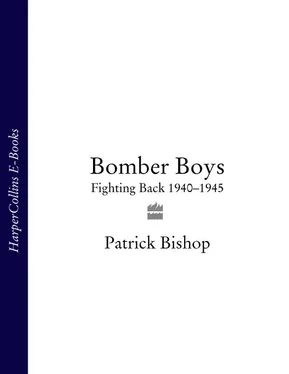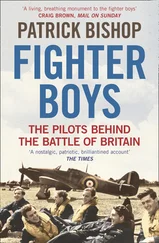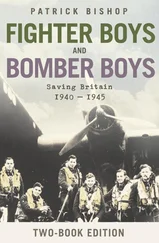Some of the Wellingtons claimed to have located targets to bomb at Brunsbüttel but if they did they caused them little harm. Four aircraft were shot down by German fighters. A gross navigational error meant that two bombs were dropped on the Danish town of Esbjerg, 110 miles to the north, killing two innocents. The day’s efforts had achieved nothing and resulted in the loss of nearly a quarter of the aircraft dispatched.
These initial efforts displayed many of the myriad weaknesses of Bomber Command as it set out to justify the extraordinary claims that had been made in its name in the years between the wars. The operations were based on sketchy intelligence and preceded by only the most perfunctory of briefings. The aircraft were the best the RAF could offer but the navigation equipment available to guide them to their targets was primitive, and some of the bombs they dropped were duds. The training the crews had received, long and arduous though it had been, had still not properly prepared them for the job. And the tactics they were following were clearly suspect, given the losses that had been sustained.
On the other hand, the episode did provide a demonstration of the potential of Bomber Command’s underlying strength. The crews had shown a powerful ‘press on’ spirit, with fatal results in the case of most of those trapped in the seven aircraft that went down. Despite the paltry results, nothing could be inferred about the quality of the airmen. The man whose memoirs provide the basis for the account of the first raid, the pilot of the Hampden who got lost, was the twenty-year-old Guy Gibson, who three and a half years later was to lead the triumphant Dams Raid. At the time, though, these first operations served mainly to expose the RAF’s weakness and to reveal the huge gap between what a bomber force was supposed to do and what it could in fact achieve.
In their short life, bombers had gained an awesome reputation for potential destructiveness. The prospect of unrestricted air warfare tinged the mood of the interwar world with quiet dread. It cast the same shadow of fear and uncertainty over life as the thought of nuclear holocaust did in the post-war years. The sense of doom was fed by a tide of alarming articles and books.
A novel, 1944 , published in 1926 was typical of the genre. The fact that its author, the Earl of Halsbury, had served on the Air Staff’s Directorate of Flying Operations in the First World War appeared to lend particular weight to its arguments. The tale was told in the brusque, conventional prose of contemporary thrillers, but the message was revolutionary. Its hero, Sir John Blundell MP, is regarded by his colleagues as a crackpot for his insistence that another world war is inevitable. The next conflict, he believes, will bring about ‘the total obliteration of civilization not more nor less. Total obliteration, phutt, like a candle.’
He warns anyone who will listen that in ‘not more than twenty years’ fleets of bombers will be roaming the skies of Europe, dropping poison gas. The country’s air defences will prove useless. The government will be paralysed. Lacking leadership or a militaristic tradition to maintain discipline, people will turn on each other. When the first raid occurs, Sir John’s son Dick is sitting down to dinner at the Ritz with his girlfriend Sylvie. ‘Above the night noises of a great town could be heard the faint but unmistakeable hum of aeroplanes. Presently they became louder and there was an uncomfortable hush throughout the restaurant. To Dick … the noise seemed to be coming from everywhere. Trained to appreciate such things, he knew there must be an immense number of machines. Somewhere to the south came the sound of a futile anti-aircraft battery … like a swarm of locusts a mass of aeroplanes was just discernible, lit up by the searchlights, as yet mere specks in the sky. More anti-aircraft guns were heard coming into action, somewhere down the river. Bursting shells winked like fireflies in a tropical forest … the raiders were through and over London … they had easily broken through the carefully-prepared but utterly inadequate defence that met them.’ 2
Dick and Sylvie manage to escape the capital. On their way westwards they see anarchy and cruelty everywhere. A band of proletarian refugees from Plymouth turn cannibal, preying on stragglers who stray near their Dartmoor hideout. Almost everyone behaves badly. In a country mansion, upper-class loafers meet death in a last orgy of drink and drugs. At one point the pair run into a crowd of scavengers. ‘[It] was not made up of the English [Dick] had known. They were a new race, a hard, grim, cruel race, changed completely by days of want, total lack of discipline and above all by the complete dissolution of the bonds which knitted their civilization into a kindly, altruistic society.’
Halsbury was serious. He claimed his assertions were based on current scientific fact. 3Official projections of what unrestricted air war might mean were scarcely less alarming than his lordship’s imaginings. They took as their starting point the results of German air raids on Britain in the Great War, which started with Zeppelin attacks in January 1915 and continued with raids by Gotha and Giant bombers. Altogether, they killed 1,413 people and injured 3,407. The great majority of the casualties were civilians. From this data it was calculated there would be fifty casualties for every ton of bombs dropped. In 1937 the Committee of Imperial Defence, which brought together the country’s most senior airmen, soldiers, sailors and bureaucrats, was informed by its experts that the Germans had the means to maintain an all-out air assault on Britain for sixty days. This would result in the deaths of up to 600,000 people and serious injury to 1.2 million.
A year later the Ministry of Health estimated that between 1 million and 2.8 million hospital beds would be needed to deal with casualties. The huge numbers of dead would have to be interred in mass graves. In April 1939 a million burial forms were sent out to local councils.
Like Halsbury, the government also assumed that the public’s nerve would fail. The scattered bombing of the previous war had produced flickers of panic and despondency. Concentrated attacks were expected to trigger widespread hysteria. A report to the Committee of Imperial Defence in 1931 proposed throwing a police cordon around London to prevent a mass exodus and discussions began in 1937 to recruit 20,000 reserve constables to keep order in the capital. It was thought that the first duty of the army, should Germany attack, was to ‘maintain confidence, law and order among our civil population before attempting to fulfil any other role’. In the spring of 1939 the War Office warned army commanders of the sort of work their men might be expected to carry out. In one scenario, ‘crowds without food have taken refuge in the open land in the suburbs. Civil authorities have organized soup kitchens which are being rushed by hungry people. Troops are required to restore order and organize queues.’
It was suggested that psychiatric casualties might outstrip physical casualties by three to one. In 1938 a committee was formed of senior psychiatrists from the London teaching hospitals and clinics to plan wartime mental health requirements. Its report to the Health Ministry proposed a network of centres providing immediate treatment in the bombed areas, outpatient clinics and roving teams of adult and child counsellors.
These dire predictions were a reflection of a fear that gripped everyone. ‘We had entered a period,’ Churchill wrote later, ‘when the weapon which had played a considerable part in the previous war had become obsessive in men’s minds. Ministers had to imagine the most frightful scenes of ruin and slaughter in London if we quarrelled with the German dictator.’ 4
Читать дальше












